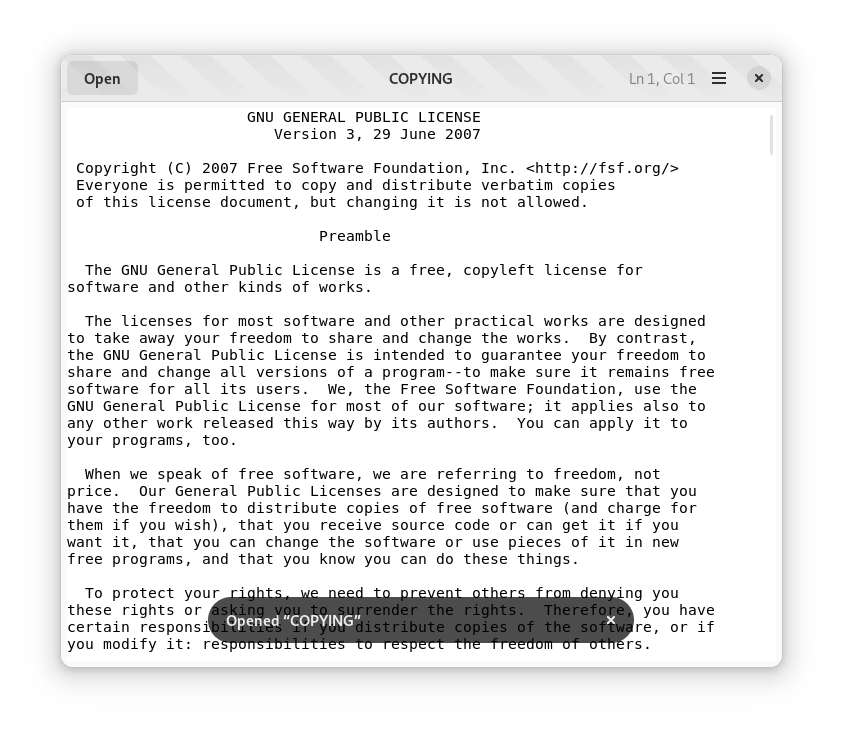Notifying The User With Toasts
Toasts, or “in-app notifications”, are useful to communicate a change in state from within the application, or to gather feedback from the user.
In this lesson, you will learn how to add a toast overlay to the text viewer application, and how to display a toast when opening a file.

Add a toast overlay
Toasts are displayed by an overlay, which must contain the rest of the application’s content area.
Update the UI definition file
- Find the UI definition file for
Text::Viewer::Window - Find the definition for the
GtkScrolledWindowthat contains the main text area - Insert the
AdwToastOverlaywidget as the child of theText-Viewer-Windowand the parent of theGtkScrolledWindow, and use thetoast_overlayid
xml
<property name="content">
<object class="AdwToastOverlay" id="toast_overlay">
<property name="child">
<object class="GtkScrolledWindow">
<property name="hexpand">true</property>
<property name="vexpand">true</property>
<property name="margin-top">6</property>
<property name="margin-bottom">6</property>
<property name="margin-start">6</property>
<property name="margin-end">6</property>
<property name="child">
<object class="GtkTextView" id="main_text_view">
<property name="monospace">true</property>
</object>
</property>
</object>
</property>
</object>
</property>Bind the overlay in the source
Add the toast_overlay widget to the Text::Viewer::Window class
crystal
module Text::Viewer
@[Gtk::UiTemplate(
resource: "/com/example/TextViewer/text-viewer-window.ui",
children: {
"header_bar",
"main_text_view",
"open_button",
"cursor_pos",
"toast_overlay",
}
)]
class Window < Adw::ApplicationWindow
include Gtk::WidgetTemplate
@header_bar = Adw::HeaderBar
@main_text_view : Gtk::TextView
@open_button : Gtk::Button
@cursor_pos : Gtk::Label
@toast_overlay : Adw::ToastOverlay
@settings : Gio::Settings
def initialize
super()
@settings = Gio::Settings.new("com.example.TextViewer")
@header_bar = Adw::HeaderBar.cast(template_child("header_bar"))
@main_text_view = Gtk::TextView.cast(template_child("main_text_view"))
@open_button = Gtk::Button.cast(template_child("open_button"))
@cursor_pos = Gtk::Label.cast(template_child("cursor_pos"))
@toast_overlay = Adw::ToastOverlay.cast(template_child("toast_overlay"))
#...Show toasts
Toasts are especially useful for notifying the user that an asynchronous operation has terminated. Opening a file and saving it are two typical use cases for a notification.
Notify after file operations
- Find the
open_filemethod forText::Viewer::Window - Add a toast at the end of the method
crystal
private def open_file(file : Gio::File?)
return if file.nil?
file_path = file.not_nil!.path.not_nil!
File.open(file_path) do |file_io|
self.title = File.basename(file_path, File.extname(file_path))
# Retrieve the `Gtk::TextBuffer` instance that stores the
# text displayed by the `Gtk::TextView` widget
buffer = @main_text_view.buffer
# Set the text using the contents of the file
buffer.text = file_io.gets_to_end
# Reposition the cursor so it's at the start of the text
buffer.place_cursor(buffer.start_iter)
# Show a toast for the successful loading
@toast_overlay.add_toast(Adw::Toast.new("Opened “#{self.title}“"));
end
end- Similarly for the
save_filemethod
crystal
private def save_file(file : Gio::File?)
return if file.nil?
file_path = file.not_nil!.path.not_nil!
File.open(file_path, "w") do |file_io|
buffer = @main_text_view.buffer
# Retrieve the iterator at the start of the buffer
start_iter = buffer.start_iter
# Retrieve the iterator at the end of the buffer
end_iter = buffer.end_iter
# Retrieve all the visible text between the two bounds
text = buffer.text(start_iter, end_iter, false)
return if text.size == 0
file_io.print(text)
@toast_overlay.add_toast(Adw::Toast.new("Saved as “#{File.basename(file_path, File.extname(file_path))}“"));
end
endIn this lesson you learned how to notify the user of a long running operation that either succeeded or failed using toasts.